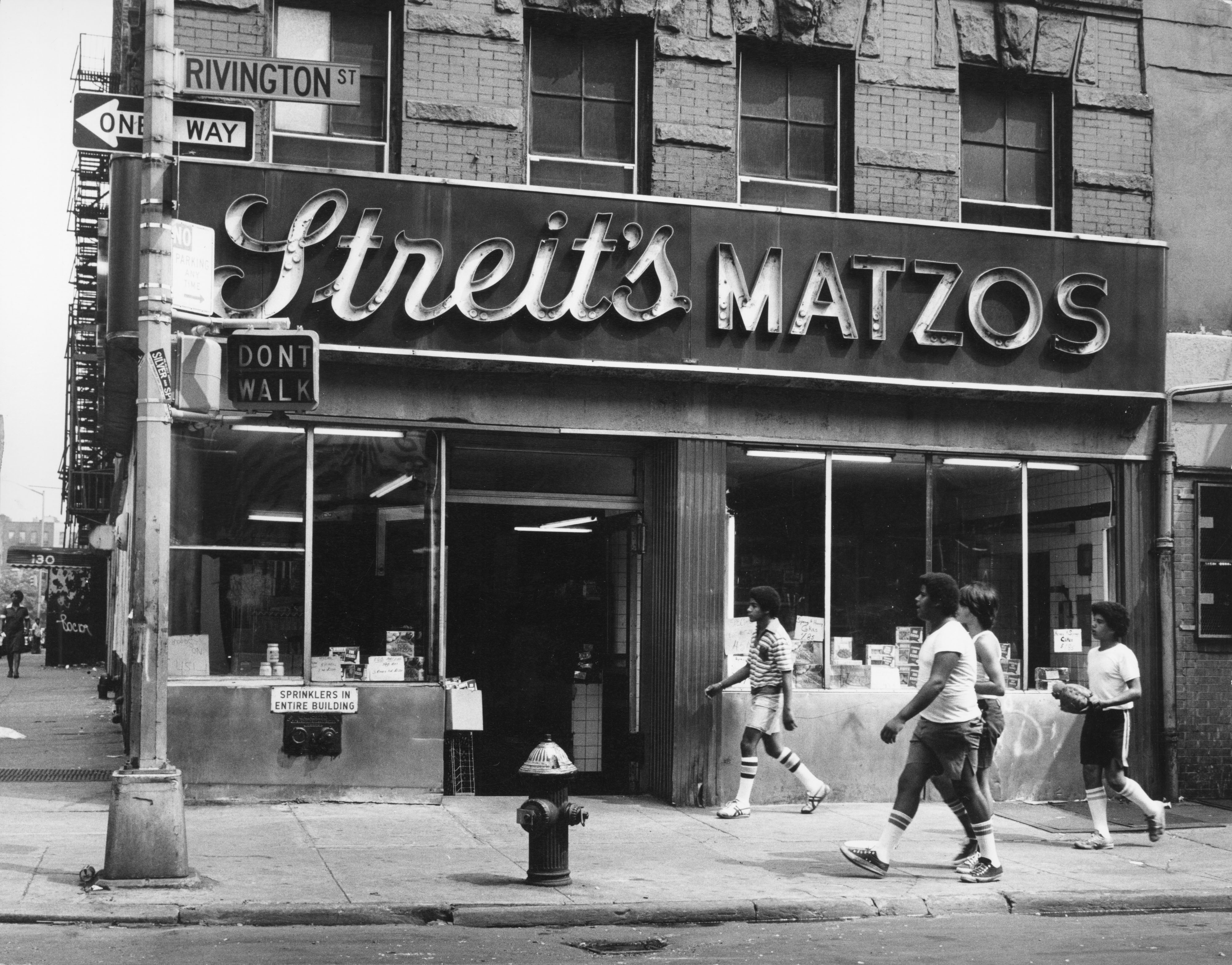Blog Archive
Remembering the Streit’s Matzo Factory

The Streit’s Matzo Factory on Rivington Street. Photo: Edmund Gillon
The spring of 2015 marked the end of an era on the Lower East Side. With much fanfare, the Streit’s Matzo Factory – a staple of the neighborhood since 1916 – permanently closed its doors. The company decided to move its manufacturing from the Lower East Side to a new plant in Rockland County. For many, the Streit’s Matzo Factory was a lasting vestige of a different time in Lower East Side history, representing a Jewish immigrant culture that has come and gone. In fact, the factory was called by several scholars, “the Jewish Plymouth Rock.”
The terrific new documentary, Streit’s: Matzo and the American Dream, which concludes its week-long run at the Film Forum tonight, tells the story of Streit’s and its significance to the Lower East Side. Directed by Michael Levine, it is a must-see for anyone interested in immigration, food, or New York history. If you aren’t able to see the film, you can check out the film’s website to get information on other screenings.
Before we go into specifics, let’s first explain – for those who are not familiar – what exactly matzo is. Matzo is an unleavened flatbread made from flour and water. The flour can be from whole or processed grains, but it must be either wheat, spelt, barley, rye, or oat. Matzo plays a significant role during the Passover festival when chametz (which is leaven and five grains that, according to Jewish Law, can be leavened) is forbidden. The tradition refers to the story of the exodus of the Jews from Egypt, when the departing families had to leave their homes before their bread had time to rise.
Aron Streit, the founder of Streit’s, was in the matzo business most of his life. Aron and his wife, Nettie, arrived in the United States from Austria in the 1890’s. Like many Jewish immigrants, Aron and Nettie maintained the Old World traditions in their new homeland, hosting Friday night Shabbos dinners. Another tradition Aron brought with him was his knowledge and ability to make matzo.
Aron founded his first matzo company with a business associate, Rabbi Weinberger, in 1916. The location of Aron’s first matzo company was actually on Pitt Street in the Lower East Side. In the Pitt Street location, Aron and Rabbi Weinberger made each piece of matzo by hand. By 1925, there was a massive Jewish population in the Lower East Side (they made up about 60% of the neighborhood) and the demand for matzo was increasing. So much so, that Aron opened a new matzo factory with one of his sons a few blocks away on Rivington Street. His second son would soon after join the family business, and the company prospered. They would remain in the Rivington Street space until 2015.
The factory was 47,000 square feet. It usually produced about 16,000 pounds of matzo each day. By the time the factory closed, it had two 75-foot ovens which baked 900 pounds of matzo per hour. The factory did adhere to strict kosher laws, allowing only Shomer Shabbat Jews to touch the matzo dough before being baked. The whole matzo baking process was under the supervision of a Rabbi, who would time the baking process to ensure that it did not exceed eighteen minutes. If it did go beyond the eighteen minutes, the matzo was discarded.
Aron Streit died in 1937, but his family continues to operate the business. Streit’s is the only family-owned and operated matzo company in the United States. The company also sold more than just matzo; they also had noodles, soup mixes, potato products, and cake mixes, among others. Today, Aron’s granddaughters and great-grandsons now run the company.
With the rich history of Streit’s Matzo Factory and all that it represented, it is easy to understand why there was a lot of publicity when the family decided to close the Rivington Street location last year. Today, not much remains in the Lower East Side of the time when it was a predominately Jewish neighborhood (though restaurants like Katz’s Deli and Russ & Daughters have managed to stay alive and well). The Streit’s Matzo Factory reminded many people – and may have given them a brief glimpse – of what life was once like here in the Lower East Side.
- Post by Jonathan Pace, Communications Manager at the Lower East Side Tenement Museum